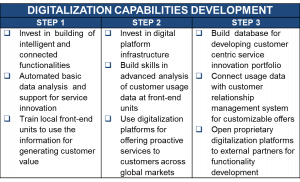
In the context of increasing connectivity and the omnipresence of information technology in large manufacturing firms and SMEs from Nordic countries, we see increased focus on adopting digital technologies, which is changing the very nature of how innovation occurs and how value are generated to customers.
In the ProcessIT.eu project we find that digitalization of manufacturing (e.g. Industry 4.0) - the phenomenon of intelligent connected machines powered by information and digital technologies – is a key enabler for new business models and values within the process industries (Parida et al., 2015). Digitalization offers opportunities for new functionality, higher reliability, greater efficiency, and optimization possibilities that exponentially increases the value that manufacturing companies can deliver to customers (Porter & Heppelmann, 2014).
Specifically, SMEs firms are therefore increasingly adopting digitalization to help themselves provide advanced service solutions (e.g taking over operational and performance responsibilities or selling “outcome” rather than a product or services). This means investing significant resources in building new capabilities to support digitalization initiatives within their organizations and to maximize the value creation potential that exists in their relationships with customers. However, many SMEs lack an understanding of what constitutes digitalization capabilities and how they can be leveraged to co-create value with customers when offering advanced product-services. Moreover, for many SMEs resources are scarce and they need to take a more step-wise approach toward digitalization capability development. To address these questions, this blog reports on insights from in-depth qualitative studies involving a number of Swedish industrial manufacturing firms and presents a framework for development of digitalization capabilities (please see references below for detailed insights).
Digitalization in practice and research findings
Digitalization capabilities represent an advanced ability to use smart and connected physical products to facilitate opportunities for global service innovation. For example, GE Aviation has climbed the customer value ladder by offering optimized asset and operations services using historical and real-time data analytics powered by embedded sensors. Sophisticated IT systems and sensors enable GE devices to be connected with each other and to transmit critical information that enables maintenance to be tailored to deliver increased operational efficiency. For most manufacturing companies, building a digitalization capability goes hand in hand with adopting a servitization strategy (i.e. transformation from being product oriented to product-service oriented). According to a telematics manager from the heavy automotive industry, “We have to expand our digital capabilities to create digital platforms on which several industrial services can be offered to global market.”
Figure 1 below presents an overall view of how manufacturing companies have developed their digitalization capabilities (please see Parida et al, 2015 for details).

Figure 1. Framework for development of digitalization capabilities
Our research shows that digitalization capabilities provide new and untapped avenues for interacting with customers’ resources, processes, and performance (Lenka et al., 2017; Cenamor et al., 2017). Indeed, digitalization capabilities enable interaction between customers and front-end service staff and manufacturing firms. Such cooperation leads co-creation of value through increasing the breadth and depth of interactions with customers. Breadth of the interactions increases as the provider starts offering more services and scouts for new opportunities to co-create value on a continuous basis through increased understanding of the customer’s sphere. Depth of the interactions increases with establishing closer cooperation with the customer and formation of strategic partnerships through win-win interactions. Therefore, we argue that the development of digitalization capabilities holds possibilities for manufacturing SMEs from Nordic region to co-create value with customers and ensure future business development.
David R Sjödin and Vinit Parida
Entrepreneurship and Innovation, Luleå University of Technology
For further reading from the project team see:
- Cenamor, J., Rönnberg Sjödin, D. and Parida, V. (2017) ‘Adopting a platform approach in servitization: Leveraging the value of digitalization’ International Journal of Production Economics, 192, 54–65
- Parida, V., Rönnberg Sjödin, D., Lenka, S. & Wincent, J. (2015) ‘Developing Global Service Innovation Capabilities: How back-end units address the challenges of global market heterogeneity.’ Research Technology Management, 58(5), 35-44.
- Lenka, S., Parida, V., & Wincent, J. (2017). Digitalization Capabilities as Enablers of Value Co‐Creation in Servitizing Firms. Psychology & Marketing, 34(1), 92-100.







